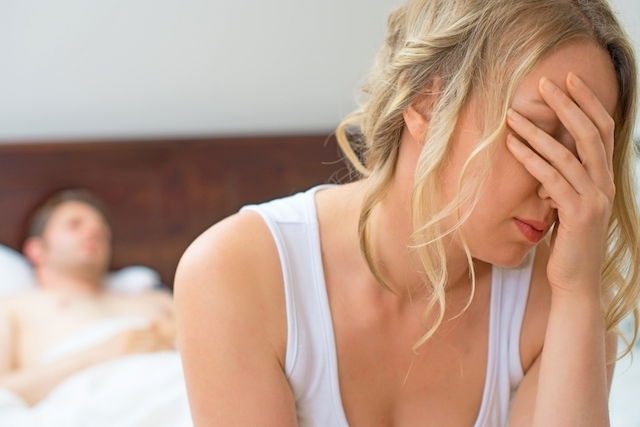Vulvodynia is a condition characterized by chronic pain and discomfort in the vulvar area. This problem can cause symptoms such as pain, irritation, redness or pricking feeling in the genital area, which sometimes can be confused with dermatosis or vaginal infections.
Generally, vulvodynia leads to painful intercourse, with symptoms that can last for hours or even days after intercourse. This condition has no cure, and therefore treatment is aimed at relieving pain and discomfort, in hopes of improving quality of life.
If you suspect you have this condition, you should see your doctor or a gynecologist for assessment to rule out other conditions and determine if there are options available to relieve pain.

Main symptoms
The main symptoms of vulvodynia include:
- Pain with palpation and irritation in the vulvar area
- Redness and a prickling feeling in the genital area
- Increased sensibility
- A burning sensation in the vulva;
- Pain during sex
Women with this condition may also have difficulty inserting tampons or doing certain activities, like horseback riding or cycling.
The main problem with vulvodynia is that intercourse is generally painful, and pain may last for hours or days after the sexual contact. The pain may be constant, and the symptoms may range from a slight discomfort to an intense pain that can interfere with basic movements, like sitting down.
Also recommended: Vaginal Pain: 9 Common Causes & What to Do tuasaude.com/en/vaginal-painHow to confirm the diagnosis
A gynecologist can diagnose the condition by palpating the area to identify where the sensibility or pain is coming from. Many times, this exam is carried out using a cotton swab to put pressure on specific points in the genital area.
Learn more about what can cause vaginal burning and how to treat it.
What causes vulvodynia?
Vulvodynia can affect women of all ages, from teenagers to women experiencing menopause.
Even though the exact causes of vulvodynia are still not known, there are several factors that are linked to the problem:
- Neuropathic pain
- Genetic factors
- Pelvic floor problems or dysfunctions
- Hormonal changes;
- Changes in the nerve systems
In addition, this disease can also be linked to other factors like fibromyalgia, irritable bowel syndrome, post-traumatic stress, depression, migraines, or recurrent candidiasis.
Treatment options
Treatment for vulvodynia should be guided by a gynecologist. It may vary from person to person, depending on the symptom presentation. Given there is no cure for this condition, general objective is to relieve symptoms and improve overall quality of life.
The main treatments approaches for vulvodynia include:
1. Daily hygiene
Daily care and hygiene of the genital area is very important for the treatment of vulvodynia. Particular focus on the vaginal skin and hygiene is needed, as using of aggressive or irritating products can worsen symptoms.
2. Medication
Medication for vulvodynia is prescribed to reduce pain and discomfort in the vulva. Some medications your doctor may consider are:
- Topical anesthetics, like lidocaine gel
- Topical hormones, like estrogen or testosterone
- Topical corticosteroids, like hydrocortisone
- Anti-inflammatories, like baclofen
- Anticonvulsants, like gabapentin, pregabalin, lamotrigine or carbamazepine
- Antidepressants, like amitriptyline or desipramine
In some cases the doctor may inject corticosteroids or botulinum toxin in the area to help manage pain.
3. Cognitive behavioral therapy
Cognitive-behavioral therapy can be recommended by a doctor and should be carried out by a psychologist. It helps women understand how their thoughts affect emotions and behaviors, which can reduce pain and suffering associated with vulvodynia.
This type of treatment can be done individually or as a couple, as it also helps to improve the couple's sexuality, bond and relationship satisfaction.
4. Kegel exercises
Kegel exercises may be recommended by the gynecologist as they help to work the pelvic floor muscles and other vaginal muscles, helping to reducing pain and tightness.
5. Gynecological physiotherapy
Gynecological physiotherapy can be recommended by a gynecologist and carried out by a physiotherapist. These exercises help restore the function of the pelvic floor muscles and reduce tension on the nerves in the vulva, which can improve sexual function.
A physiotherapist may recommend Kegel exercises, pompoir or vaginal cone exercises, in addition to the use of the TENS device, to help reduce the pain and discomfort associated with vulvodynia.
6. Surgery
Cases that do not improve with conventional treatment may require a surgical procedure known as vulvar vestibulectomy.
This surgery aims to remove the affected tissue from the vestibule, which is around the opening of the vagina. It can be done partially or completely.
